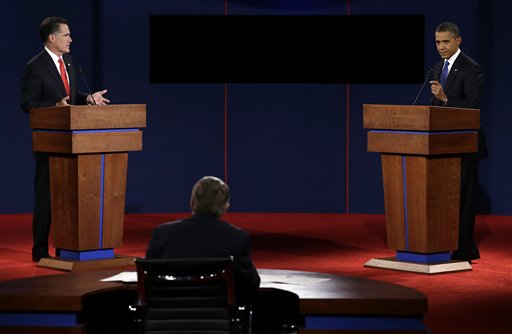
What do Lance Armstrong, Jerry Sandusky and the Mitt Romney-Paul Ryan ticket have in common?
They’ve all been accused—and in one case convicted—of lying.
For years Armstrong has been touted as a world champion cyclist, but now he’s losing the race against the growing body of evidence that he really did take performance-enhancing drugs despite his firm assertions to the contrary. Jerry Sandusky, the disgraced ex-assistant Penn State football coach, has been sentenced to a minimum of 30 years in prison—and a maximum of 60—but even now he says he never molested those kids and only had sex with his wife.
Democrats and others have accused Gov. Romney and Rep. Ryan of lying with a straight face to a national audience after the two recent debates. Their charge has gotten so heated that the conservative Wall Street Journal’s editorial page deputy editor denounced the Obama campaign, saying that its “resurrection of ‘liar’ as a political tool is odious…because it dates to the sleazy world of fascist and totalitarian propaganda in the 1930s.”
What sparked that response was Obama’s top advisor David Plouffe telling reporters on Air Force One that “we thought it was important to let people know that someone who would lie to 50 million Americans, you should have some questions about whether that person should sit in the Oval Office.”
Heavy stuff, indeed. But is there a different standard between the courtroom or the court of public opinion for detecting when someone is lying? Apparently there is, and it’s not what people think.
Maria Hartwig, a social psychologist who teaches at John Jay College of Criminal Justice in Manhattan, has just completed a review of 50 years of studies on perceptions of trustworthiness, deception and judgment and reached a startling conclusion.
“When you talk to people, they almost always say that they’re bad liars but they can tell when others are lying,” Hartwig says. But “our research shows it’s the other way around: People are quite good liars…but very poor at detecting lies.”
In her findings, people’s judgments are so inaccurate they might as well flip a coin. And she points to the growing number of cases in which confessions—usually coerced under intense police interrogation—have been reversed by DNA findings.
The reason is that all the stereotypical behavior liars supposedly show—nervousness, fidgeting, looking askance—are not necessarily signs of lying; they can be symptoms of being under pressure.
“The main reason why detecting lies is so difficult is because liars and truth-tellers behave so similarly,” Hartwig says. “Liars don’t look like liars! Conversely, truth-tellers might look shady sometimes because they’re nervous or stressed.”
Distinguished law professor Richard Klein tells his students at Touro Law School that it’s “exceedingly hard” to know when somebody is lying in the courtroom and that most jurors assume that when someone takes an oath to tell the whole truth in a trial, they will do so—even if they definitely will not. A trial lawyer, Klein says, “has to walk delicately. You can’t come down too hard on someone.”
What he recommends is a subtle approach with a witness (or a suspect) because “if they think you’re asking them these harmless questions and you’re not really an antagonist, then it’s often possible to lead them down a path that conflicts what they had said earlier, or makes a story that can’t be the case.”
As for the dismal first debate performance of President Obama—who, like Klein, went to Harvard Law School—Klein says he came off as too aloof and disengaged.
“What’s funny is that people reacted so negatively to him—the way jurors react to a witness,” Klein says. “In that the worst thing you can do is to appear not to care about what is happening. This is true for a defendant in a criminal case as well.”
Klein’s Touro colleague, Marc Gann, a former Nassau County prosecutor now practicing criminal law in Mineola, says that “winning or losing a criminal case is not about hitting home runs. It’s more about the little points you can win, the details—and that’s really where you can potentially trip people up, especially if somebody’s lying.”
Likewise, he says that the trial lawyer can’t be perceived as coming on too strong like a bully. The attorney’s job is to pose a series of questions that ultimately lead to the big point “that you never ask in front of the jury, but which is: ‘Are you shitting me?’… Hopefully, the jury is asking that question so you don’t have to ask it.”
As for drawing comparisons between a court proceeding and a presidential debate, Gann says, “The difference is that most people don’t really listen to what either Romney or Obama has to say. I think all they want to see is the manner in which they say it.”
And then, as Professor Hartwig found out in her research, people’s perception of who’s lying or not often tends to be wrong.
“If you’re going to get a sense of whether somebody is telling the truth,” Hartwig recommends, “I don’t think it’s sufficient just to hear how they speak, and see how they act when they’re speaking. I think you need to know what they’re actually talking about.”



































